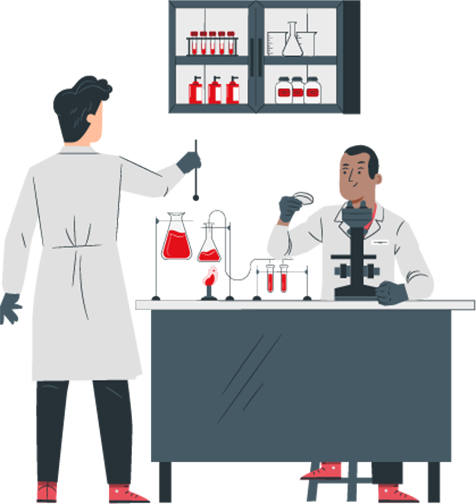
Let Dr. Gaur
Recommend A Package For You
STARTING FROM ₹399*

100+ TrustedLabPartners #OurBloodRelations


100+ TrustedLabPartners#OurBloodRelations


Diabetes Screening Test In Delhi
Diabetes screening test is done to determine if you have diabetes, a condition which affects blood glucose levels.
Read further to know more about the diabetes screening test in Delhi, including its price and cost, procedure, side effects, test results, etc.
Book nowAN OVERVIEW
About diabetes screening test
Why is the diabetes screening test done?
- To examine blood sugar levels if the risk factors associated with the disease are present.
- As a part of regular health checkups.
- To monitor the blood glucose levels of those diagnosed with diabetes.
- To detect gestational diabetes.
- To examine the efficacy of the treatment being given for diabetes.
What does the diabetes screening test measure?
There are two tests under the diabetes tests, glycosylated hemoglobin test and the glucose-fasting blood test. Both of these help in diagnosing diabetes.
- The glycosylated hemoglobin test measures the levels of glycosylated hemoglobin present in the blood, giving us an estimate of the average blood glucose levels of the last two to three months (8 – 12 weeks).
Hemoglobin is a protein present in the red blood cells. It is responsible for transporting oxygen to our organs and tissues. Hemoglobin has different types. Hemoglobin A is the most common. An increase in the blood sugar levels leads the glucose to bind to Hemoglobin A (this is called glycosylation or glycation). This continues for the RBC’s total lifespan (120 days). Larger amount of glucose in the blood will lead to more binding to Hemoglobin A.
The most common type of glycated hemoglobin is Hemoglobin A1c, which is removed and replaced by non-glycosylated hemoglobin. HbA1c levels in the blood signify our blood glucose levels, which, in turn, help in diagnosing diabetes and in measuring the efficacy of the treatment being given for reducing blood sugar.
- The glucose-fasting blood test checks whether the body is properly utilizing and storing glucose. High blood sugar levels can indicate diabetes or insulin resistance. Type 1 diabetes is a result of insulin deficiency (low production of insulin). Type 2 diabetes is caused when there is sufficient insulin production but its efficient utilization is absent.
Risks/side effects of diabetes screening test:
There are no side effects associated with the diabetes screening test. However, for a few days, you might feel some pain in the area from where the blood was taken using a needle.
ABOUT US
Why Choose Flebo.in’s Home Collection Service?
At Flebo.in, we thrive to deliver quality healthcare & diagnostic services to our valuable customers at their doorsteps. We are just a call or few clicks away to book your pathology test or a health package. Avail our services from the comfort of your home, office, or while you’re on the go.
Choose from a wide range of certified labs which undergo regular audits to ensure accuracy. Delay in reporting of your test result, without prior information, entitles you for a refund. Your Flebo.in account maintains the history of your test reports, irrespective of the chosen lab.
Our Phlebotomists are trained and qualified under a unique program designed by industry experts, who use FDA approved pre-analytical consumables for sampling.
Customer satisfaction is our utmost priority, and a Phlebotomist from Flebo.in will guarantee you:
Punctuality – Sample collection at your chosen time
Attentiveness – Concerned to handle your pre-test anxiety
Safety – Ensuring proper hygiene during the visit
Skillfulness – Certificate shared with you before the visit
FREQUENTLY ASKED QUESTIONS
FAQs
When is the diabetes screening test performed?
The diabetes screening test can be done for those who are overweight and not physically active, have high cholesterol or high blood pressure, or have the disease or heart problems running in their family. Those who are above the age of 45 are advised to undergo the screening test every 3 years.
If you are experiencing symptoms such as an increased hunger and thirst, unexplained weight loss, frequent urination, tingling in your hands or feet, fatigue, blurred vision, etc, you can also go for the diabetes screening test.
Polycystic ovary syndrome is also a risk factor for developing diabetes.
How to prepare for the diabetes screening test?
For 8-12 hours before your diabetes screening test, you should not intake anything, except water.
How is the diabetes screening test performed?
The diabetes screening test involves taking a blood sample from a vein located in your arm. A syringe is used for the same. The area from where the blood would be taken would first be cleaned with an antiseptic solution. Once the blood sample has been collected, it will be sent to the laboratory.


THINGS TO KNOW AFTER GETTING TESTED
Interpreting the diabetes screening test results
Reference Range:
Glycosylated Hb: Below 5.7%
Fasting Blood Sugar: 70-100 mg/dl
Glycosylated hemoglobin levels are mentioned in the table below:
| Result | Range | Indication |
| Normal | less than 5.7% | Normal blood sugar levels. |
| Prediabetic | 5.7% – 6.4% | Risk of developing diabetes is prevalent. |
| Diabetic | More than 6.5% | You might be having diabetes. |
Fasting blood sugar levels are mentioned in the table below:
| Result | Range |
| Normal | 70 to 99 mg/dL |
| Prediabetes | 99 to 126 mg/dL |
| Diabetic | More than 126 mg/dL |
Customer Reviews
Some of Flebo.in's customers reviews
STEPS OF BOOKING
Steps to book diabetes screening test for home collection in Bangalore
Our state of the art user interface makes the process of booking a painless sample collection test hassle free, time efficient, and convenient. Instead of searching “diabetes screening test near me” or “diabetes screening test in Bangalore”, you can do the following:
Phone Number
an OTP
Details
Appointment
















